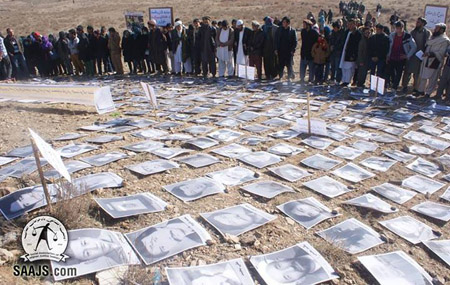By Nematullah Tanin
Kabul’s infamous prison Pul-e-Charkhi claimed the lives of thousands of political prisoners who were brutally tortured and executed under the Khalq and Parcham regimes. A testimony*
Jamila’s 22-year-old husband was picked up by the secret police, and was never seen again. She says she searched everywhere in Kabul for him for two months. “He still has not returned.”
Time has dimmed her memory of whether he was picked up before or after what is called as the Chendawal uprising of 2nd Saratan in the year 1358 (1979). Everywhere people defied the communists and chanted Allahu Akbar from the rooftops. It was the first protest for freedom, and demand for political and social changes.
Before the communists took over power Jamila had lived with her husband’s family in Mir Bacha Koot district, Kabul province. “It was a time of happiness and we had everything we wanted and thanked God for it,” she says.
The first blow was her father-in-law’s death. He had gone shopping when he was shot in the Pul-e-Sofian area for being linked to the Ekhwanis (those who were fighting against the communist government). “We left our home and came to Kabul to live in my father’s house which was in Chehelsotoon. But I didn’t know death would catch my husband here.”

The Social Association of Afghan Justice Seekers (SAAJS) paid tribute to the people killed in the execution site near Pule Charkhi prison, on Dec. 12, 2013. Family members of the victims brought photos of their loved ones and placed them on what might be the mass graves of the martyrs. (Photo: SAAJS.com)
She remembers when they moved to Kabul her husband had to give up his studies. He was in the final year of high school in the village. “Those days Babrak Karmal was the president. So much time has passed my husband has not come back,” she says forlornly.
Jamila even went to Pul-e-Charkhi looking for her husband. She was told he was there. But all she was able to find was his name on a list. “The only thing that I found was the name of my husband on a list. Finally I got permission to see him, but the soldiers told me that he had already been taken away from that place. I understood that they (communists) had martyred my husband but it was not known where he had been murdered or where his grave was.”
Three deaths
Jamila tried to keep the news from her family members but eventually ended up telling her mother-in-law who could not bear the pain of the loss and died. “My mother-in-law’s heart exploded. She was so depressed that she died of sorrow,” she says. Jamila says with her mother-in-law’s passing away, “I lost a place to cry in”. Within six months three members of the family were dead.
Jamila says with the political situation deteriorating all the wealthy members of her family left the country. Jamila was left alone with her two fatherless children, and a few other family members. “Life was very tough for both men and women. When men could not find jobs how could a woman?” she asks.
Jamila fled Kabul to a refugee camp. “I spent two years in hunger and loneliness,” she recalls. She says she got no help from anyone because she was a woman without relatives. “I was in a big exam set by God that required patience to come out of it,” she says.
Forced to marry
After the fall of the Najibullah government in 1992 Jamila returned to the country. She thought there would be peace after the Soviet pullout but found the mujahedin factions were at each other’s throats.
“I stayed in Chehelsotoon but after some time we left that area as well due to the civil war. I was sorry I had returned because no one was sure if they would see a new day. I wished for death because I had no shadow on the ground and no star in the sky … No one was there to be a breadwinner for me.”
She says rockets were raining on Kabul and people were dying. “I was desperate to find a safe place. We went to Khairkhana (the only safe area during the civil in Kabul). We stayed in a mud house, and lived on charity. Life was like a daily sip of poison!” she says.
Jamila was put through another test. In Khairkhana she was forced to marry a “commander”. “One day a commander came to our house, he asked some questions and then brought us food stuff and clothes. We were happy, and started praying for him. His gifts to us increased, and so did our prayers for him,” she says.
But the commander wanted Jamila to marry him. When she refused he threatened her. “I don’t want to say his name but he threatened to punish me so severely that I would not remember anything. I feared for my children’s lives. The commander forced me to marry him.”
For six months Jamila put up with the commander’s abuse, and then escaped to Peshawar. She returned in 2002. She says she is still scared of the commander. Her children have grown up and work as construction workers. And Jamila has found work in an office.
*The testimonies of survivors of war crimes are our contribution to creating greater public awareness about people’s hopes and claims for justice, reconciliation and peace.



